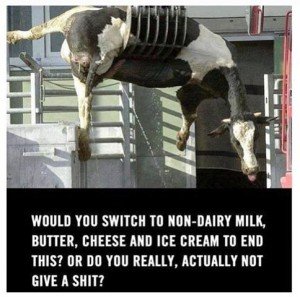The "Happy Meat" Myth
I have often heard the word "humane" used in relation to meat, dairy, eggs, and other products like cosmetics. I have always found this curious, because my understanding is that humane means to act with kindness, tenderness, and mercy. I can tell you as a former animal farmer that while it may be true that you can treat a farm animal kindly and show tenderness toward them, mercy is a different matter.
A few weeks ago I reposted this photo and caption from my friend Stephanie's Facebook page. Someone (whom I quietly unfriended) commented, "So that's how he jumped over the moon." (What upset me most about that comment wasn't its callousness, but the fact that this person is a parent, and will therefore be passing this attitude along to his child; and his child deserves better than that.)There is heinous cruelty perpetrated upon animals in factory farms all over this country, and unless you are a jerk (see above) it is more difficult to deny this fact once you've seen such an image. A couple of friends left more respectful comments, saying they purchase their dairy products from a local farmer. I know they mean well, and I'm glad they don't support factory farming any more than I do, but there is a lot of wishful thinking involved here. We like to believe that "happy cows" and "happy pigs" and "happy chickens" actually exist at those smaller farms, and while they may escape the most horrible forms of abuse like what the cow in the photo went through, they are still not treated as the pets or friends-on-four-legs the dairy and meat industry marketing campaigns would have you believe them to be.I am the first person to admit that before I went vegan I poured ordinary cow's milk (i.e., from a factory farm) on my Cheerios without giving a thought to the way those cows had been treated. I wanted to ask those Facebook friends, "How many times have you actually eaten hamburgers, steak, or bacon without knowing for certain that it came from an organic family farm, where the animals are treated 'humanely'? Never? Are you really that perfect?" Nobody is. Perhaps my definition of "humane" differs from the dictionary's, but as you know, I believe in the power of semantics. The use of the word humane, to me, begs a simple question: would I, as a human, want to be treated this way?
- I wouldn't want to live in a crate, cage, or stall, standing up to my ankles in my own feces.
- I wouldn't want my eggs or breastmilk taken from me on a daily basis. (My eggs! Crazy, right? We do tend to forget we have essentially the same reproductive equipment as the animals we eat.)
- I wouldn't want my child taken from me, destined to be somebody's dinner.
Am I just anthropomorphizing again? Do animals really have feelings of their own? Let's reframe. What would you do if you found yourself in a slaughterhouse queue? Is it safe to say you'd do absolutely anything to save your own life? So did this cow (and he's not the only one).When I was a child, I was lied to about how and why cows produce milk. I was told that cows "gave" milk every day as a matter of nature, and that farmers were doing them a favor by relieving their udders--that it was a "win-win" situation. No one told me that cows had to be forcibly impregnated before they could produce milk, just as my mother had to carry me in her womb before she could breastfeed me.Ultimately this "happy cow" stuff comes down to marketing versus honesty. If you want to eat animal products, that is, of course, your choice. But don't deceive yourself. Those cows, pigs, and chickens aren't remotely happy so long as we are exploiting their bodies for food.
God, grant me the courage to know what happens to animals, and the grace not to hate humans because of it.-- Victoria Moran (@Victoria_Moran) July 10, 2013
Is there Happy Meat? "The Ultimate Betrayal" lifts the veil of secrecy surrounding animal farming http://t.co/QKt48aqqyF #FactoryFarms #Book— VNN (@VeganNewsNet) August 22, 2013
